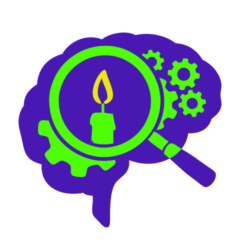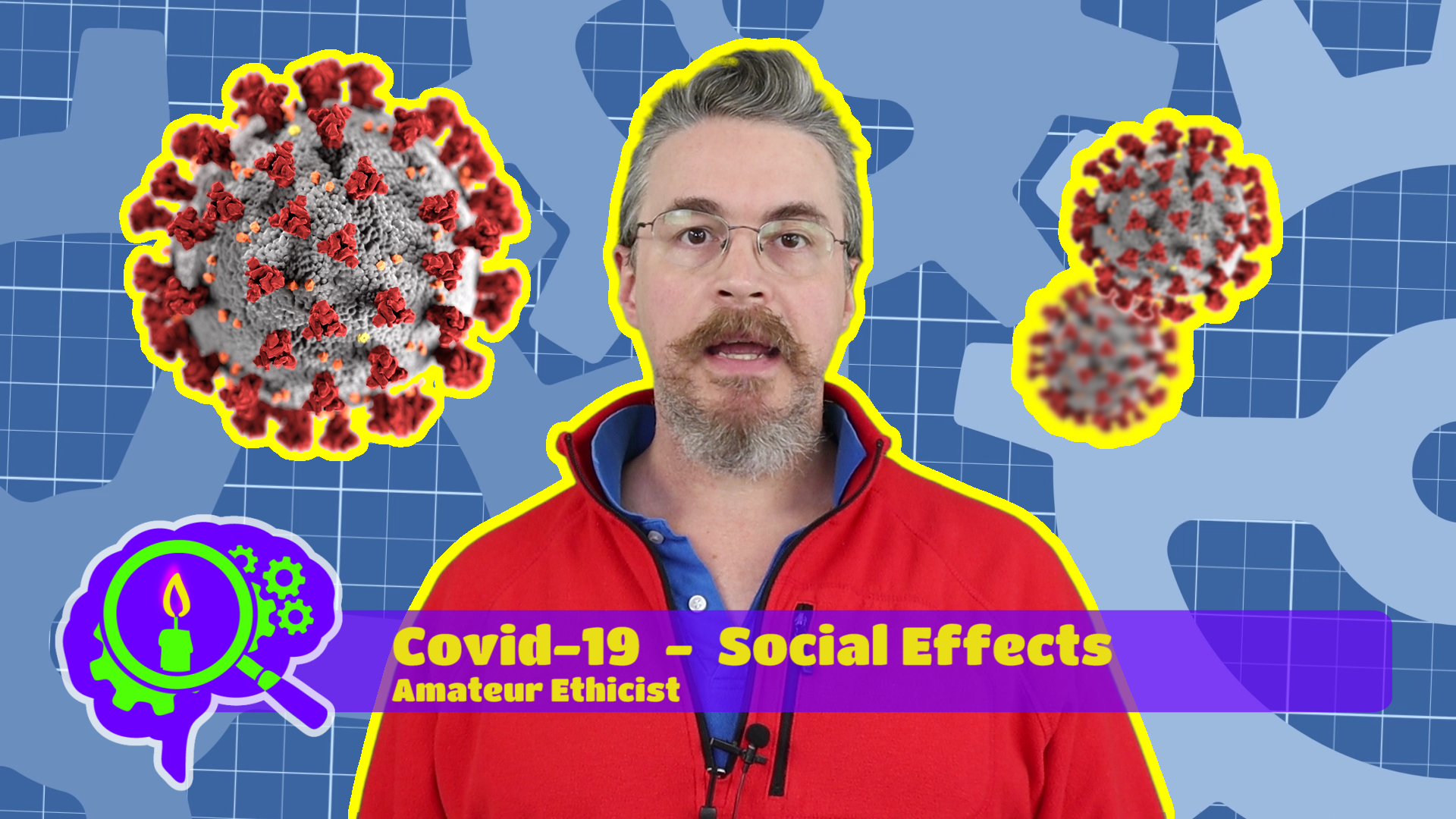Covid-19 is here. While we shouldn’t panic, we should definitely remain alert. This virus is leaving a broad tear in the fabric of our society. Hi, this is Chris, the Amateur Ethicist. That’s the topic of this segment, “Covid-19 and our Social Fabric.”
Side Note:
Dearest friends, family, world. The needle on the dial is moving much faster now, and is about to go off the scale. I want to extend my deepest condolences and sympathies for those near and dear to you that you may lose in the coming weeks. We’re all in this together. I hope when we’re over this hump we’ll be able to make things better for this world. It’s wake-up time. Be safe!
Important Factors About This Virus:
- Transmission Rate: R0 = 2.5,
- Mortality Rate: 5%
- Mutability (Mutation Rate): Uknown
- There is currently no vaccine.
- You are likely going to catch Covid-19. It’s just a question of when.
- It’s likely you don’t personally know someone who died from flu last year. Unlike the seasonal flu, it’s very likely you’ll know at least someone who will not survive Covid-19.
- Because we were not well prepared, the logistics curve we are seeing in Italy is about ten days delayed from the US. It’s going to get a lot worse before it gets better.
That’s why it’s important to slow down the rate of transmission by social distancing. That means not hugging or shaking hands with neighbors, friends or relatives, especially outside the circle of people in your home. You can unknowingly become a vector for this virus while you still feel perfectly healthy. About 20% of the people you know — when they get the virus — are going to need serious medical attention. We don’t have enough hospital beds in any community to deal with that many serious medical conditions all at once. By keeping your distance, you’re helping to retard the spread of the virus, thus flattening the curve, so the hospitals will be better able to cope with the patients who need help, spread out over time, including those who have non-virus-related medical problems.
The WHO, CDC and other health organizations are working to make sure the people of earth remain safe. But until we have a vaccine, Covid-19 is having a drastic effect on our economy and on society.
A lot of people are furloughed or not working because their line of work requires a steady flow of customers. Many of us couldn’t find our way through a $400 emergency if we also needed to take merely two weeks off. And I only have to mention the stock market. It’s going to be a little while before the products made in China that we’re so fond of are going to be available in the quantities that we’re used to. The prices are going to change. How will we handle this?
And how did we get here? Politics and money. Since it’s prudent to stay home right now, this is a great time to do some positive skeptical research online about how things actually got the way they are. Search the recent news. Don’t rely solely on what you hear on social media. Unless it’s from the page of an actual news outlet, Facebook is not news. If it sounds like fear-mongering, don’t spread that. Treat what you learn like a virus. Verify any fact before you share it. You may be surprised to find that we didn’t have to be this unprepared. Learn what’s happening right now and when you find out enough, contact your representatives and senators and give them a piece of your mind. Frequently. Make your voice heard. After all, we’ve got the time. Let’s put that time to use. You can call, write them an email or snail mail, or fill out a form on their website, or you can post publicly in the Town Hall section on Facebook and let everybody else hear your voice at the same time.
For many of us the most reliable news is coming from local and state agencies. Pay close attention to your local and state news, but also watch news from outside the United States for a rounder understanding of what’s actually happening. Because this is global. It’s not just about the United States.
Regardless, the career scientists of the CDC, WHO and other vetted health agencies know what they’re talking about, even if our administration is lacking a vigorous response. Pay attention to what Anthony Fauci and other career scientists have to say on their websites and in the news broadcasts. It’s important.
It’s amazing the creative and insightful ways many people are responding in neighborhoods, in wider communities and on the internet to help those around them make the best of a crummy situation. If you have elderly neighbors or friends who live alone, why not give them a phone call to check up on them periodically?
If you’re looking for other reliable news and informational resources that are outside the US, a number news venues to turn would be DW or DuetcheWelle out of Germany, BBC out of the UK, ABC Australia, and CBC News out of Canada all of whose journalists seem to have a level-headed approach to these concerns and how to face them, and all of them pretty much devoid of US politics. Any politics that you do see will be an honest glimpse of how people from outside the United States view how we are handling our own situation. That could be a good perspective. In your research, if the resource or website isn’t the CDC, WHO, governmental or university or peer-reviewed website, verify and follow up with anything proposed as fact before believing what they say. There are links to well-reasoned information in the accompanying article to this video on my website. If you have additional resources, please let me know in the comments and I will curate and add them as appropriate to the list. If any of the resources I’ve provided seem sketchy, let me know too.
We have to revise our understanding of what it means to live in a world with so many people. For instance, when people in a mostly elderly community wonder why they should pay taxes for local schools when they don’t have any kids in that school, it’s because those kids will grow up to be their doctors and plumbers and electricians, and they’ll need the best damned education they can get so you and your house stay in good repair. At the end of WWII, the UK had so many people who were physically damaged and monetarily depleted by war, they had to nationalize health care. Leaving any segment of society to suffer meant everyone suffered. It was the most natural thing in the world, and they haven’t looked back. We’re facing the same level of crisis today in the US. Too many of our neighbors don’t have the money to make ends meet let alone pay hospital bills. We’re talking about our parents and our kids.
In a way, Covid-19 is a live test run and a wake-up call for our federal and local governments and our health agencies. How we respond to this pandemic will inform how we can prepare for the next. Because there are already new viruses of concern spreading. Given the factors involved, this virus seems to have hit a sweet-spot. It’s just infectious enough, just virulent enough, and possibly just mutable enough to cause a sustained change in our society. If we can’t kill it, we may have to live with a virus that’s statistically a bit worse than a seasonal flu. Our human population density, the effects of climate change, frequent long distance travel, our basic need to celebrate together… How would we handle something worse than Covid-19?
Until then, wash your hands frequently and avoid touching your face. Avoid contact with other people. Once we’re past the worst, bump elbows instead of shaking hands. If you are in a position to help somebody else in need, go the extra distance. Self quarantine as if you’re already exposed, and keep a level head. If you can work from home, now is the best time to try to make that happen.
Afterthoughts:
YouTube creators are generally loath to use terms like “Covid-19”, “Quarantine”, “Coronavirus”, etc. because when these terms get mentioned even casually, their videos get demonitized. So the same brilliant social media influencers that could be making a difference with young people are being monetarily penalized by the system that allows them to spread vital information. This is how many YouTube creators pay bills. If anyone out there in YouTube corporate is reading this, please consider making some changes in your algorithms so we can stop tip-toeing around an important message.
I’m trying to grow the Amateur Ethicist YouTube channel. I’ll admit it’s not easy. But if you’ve read this far, I assume what you saw had meaning for you. Please subscribe, like and hit the bell icon. Please tell others who might be interested about my channel. These only cost you seconds of time and nothing from your pocket, but it might help me. I will continue to strive toward producing useful content. Thank you!
Resources
CDC
- What do I need to know?
- I’m Sick – What do I do?
- There’s a big event coming up – What do I do?
- Protocols for Home, School, Work, Religious Gatherings, etc.
- Covid-19 Situation Summary
WHO
Immediate Statistics
- Worldometers – Live Charts/Graphs Coronavirus
- NYTimes World Coronavirus Map – US Coronavirus Map
- Johns Hopkins – Map (Not updated as quickly as worldometers) – Coronavirus COVID-19 Global Cases
- Khan Academy – How to estimate cases in your area
Various University Resources
Found online
- NYTimes: Here’s the Biggest Thing to Worry About With Coronavirus
- Science News: What WHO calling the coronavirus outbreak a pandemic means
- Reddit: PSA: A Note of Caution Regarding Covid-19
- Reddit: /r/CoronavirusUS
- Reddit: /r/CoronavirusCA
- BBC: Coronavirus: Should Americans be worried?
- Datawrapper: 17 responsible live visualizations about the coronavirus
- Red & Black: 9 Athens songs to wash your hands to
- MSN: Coronavirus will bankrupt more people than it kills — and that’s the real global emergency
- Medium: Social Distancing: This is Not a Snow Day
- Politico-EU: Germany confirms that Trump tried to buy firm working on coronavirus vaccine
- Washington Post: Why outbreaks like coronavirus spread exponentially, and how to “flatten the curve”
Credible US News Venues
- PBS Newshour (US) – on YouTube
- NPR News (US) – NPR website
- NPR News (US) – on YouTUbe
- NPR and PBS are also available on most cable networks and local aerial radio (NPR) and TV (PBS) in the US.
- Vox: Why fighting the coronavirus depends on you – on YouTube
Credible Non-US News Venues
- ABC News (Australia) – on YouTube
- CBC News (Canada) – on YouTube
- BBC News (UK) – on YouTube
- Channel4 News (UK) – on YouTube
- DW (DeutscheWelle – Germany) – on YouTube
Credible Non-English Speaking News Venues
- Let me know your preferred resources so I can list them here.
Home Schooling – Learning – Wonder
- Virtual School Activities – List of live learning activities to watch
- Ichthyosaur cutout – pdf on Google Drive
Exploring Nature When You’re Stuck at Home - List of Education Online Companies offering free subscriptions during Covid-19
- Hogwarts Digital Escape Room
- Google Earth Launches 31 Tours of National Parks – Country Living
Dark Humor
- “Cattening the Curve” – Twitter
- SMBC COVID-19 Book Pack


